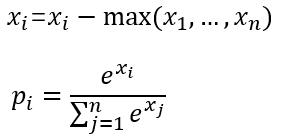caffe层解读-softmax_loss
转自https://blog.csdn.net/shuzfan/article/details/51460895。
Loss Function
softmax_loss的计算包含2步:
(1)计算softmax归一化概率
(2)计算损失
这里以batchsize=1的2分类为例:
设最后一层的输出为[1.2 0.8],减去最大值后为[0 -0.4],
然后计算归一化概率得到[0.5987 0.4013],
假如该图片的label为1,则Loss=-log0.4013=0.9130
可选参数
(1) ignore_label
int型变量,默认为空。
如果指定值,则label等于ignore_label的样本将不参与Loss计算,并且反向传播时梯度直接置0.
(2) normalize
bool型变量,即Loss会除以参与计算的样本总数;否则Loss等于直接求和
(3) normalization
enum型变量,默认为VALID,具体代表情况如下面的代码。
enum NormalizationMode { // Divide by the number of examples in the batch times spatial dimensions. // Outputs that receive the ignore label will NOT be ignored in computing the normalization factor. FULL = 0; // Divide by the total number of output locations that do not take the // ignore_label. If ignore_label is not set, this behaves like FULL. VALID = 1; // Divide by the batch size. BATCH_SIZE = 2; // NONE = 3; }
归一化case的判断:
(1) 如果未设置normalization,但是设置了normalize。
则有normalize==1 -> 归一化方式为VALID
normalize==0 -> 归一化方式为BATCH_SIZE
(2) 一旦设置normalization,归一化方式则由normalization决定,不再考虑normalize。
使用方法
layer { name: "loss" type: "SoftmaxWithLoss" bottom: "fc1" bottom: "label" top: "loss" top: "prob" loss_param{ ignore_label:0 normalize: 1 normalization: FULL } }
扩展使用
(1) 如上面的使用方法中所示,softmax_loss可以有2个输出,第二个输出为归一化后的softmax概率
(2) 最常见的情况是,一个样本对应一个标量label,但softmax_loss支持更高维度的label。
当bottom[0]的输入维度为N*C*H*W时,
其中N为一个batch中的样本数量,C为channel通常等于分类数,H*W为feature_map的大小通常它们等于1.
此时我们的一个样本对应的label不再是一个标量了,而应该是一个长度为H*W的矢量,里面的数值范围为0——C-1之间的整数。
至于之后的Loss计算,则采用相同的处理。






